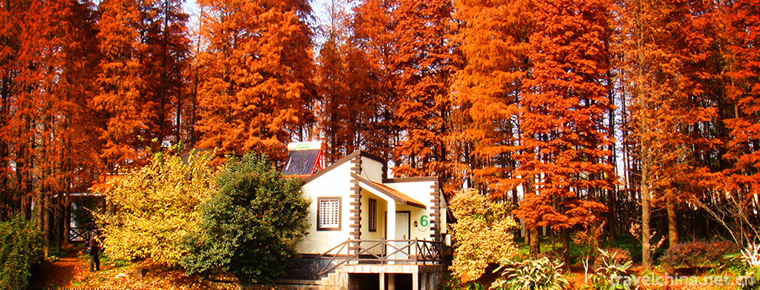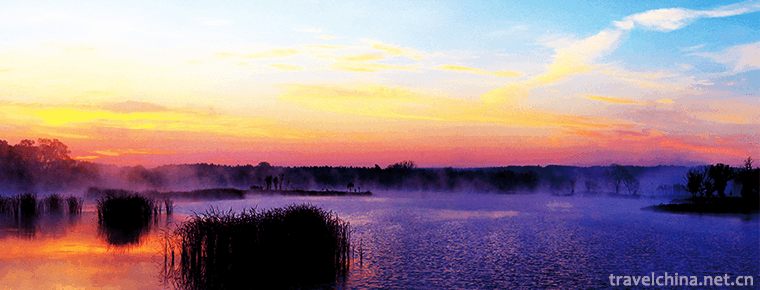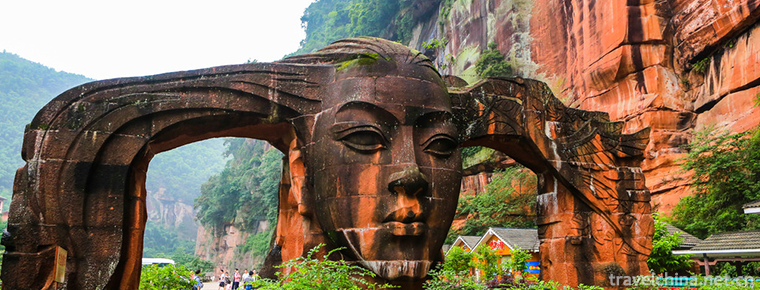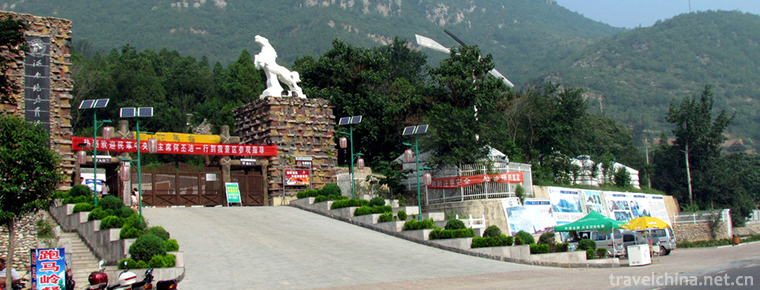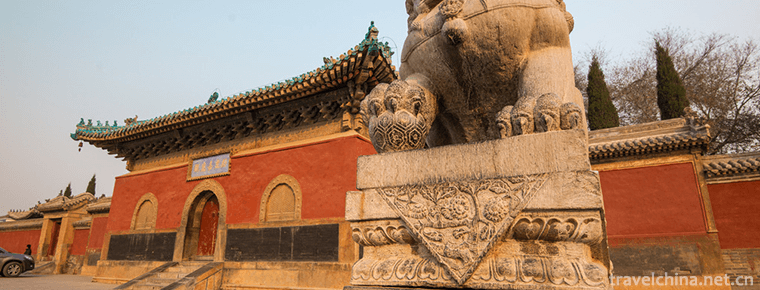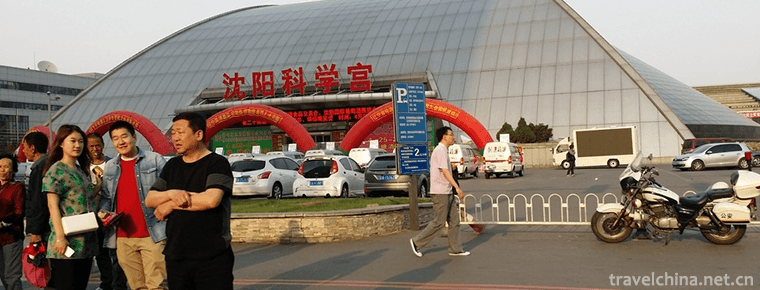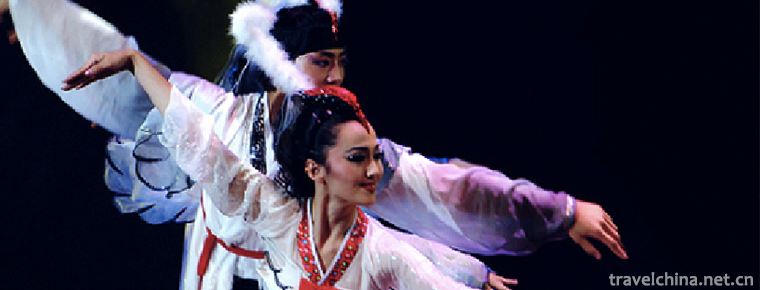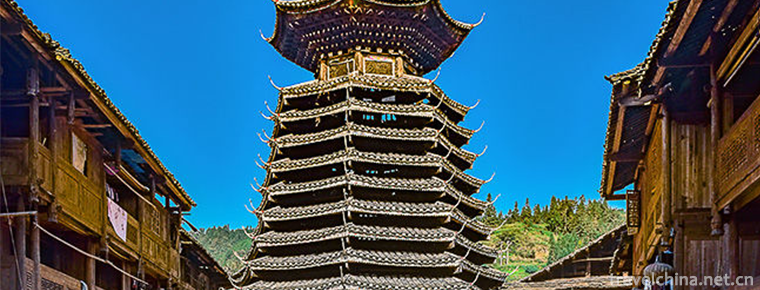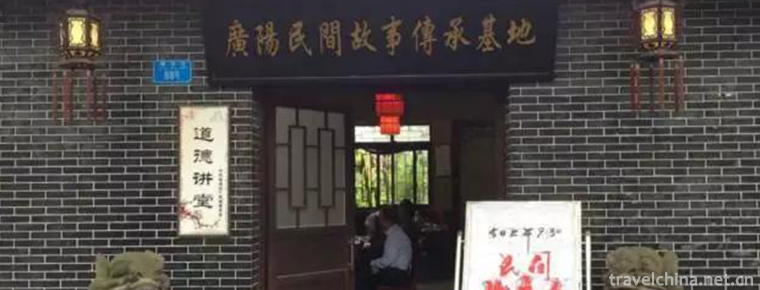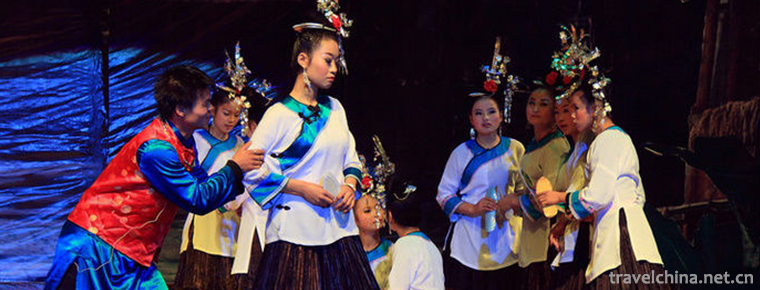Traveling Books in Ningbo
Traveling Books in Ningbo
Ningbo Walking Book, originally known as "Lotus Document" or "Plough Document", is one of the traditional local operas in Ningbo, Zhejiang Province. Sing in Ningbo dialect. Ningbo Walking Book was named in 1956. Yuyao rural area, which was formed in Guangxu period of Qing Dynasty (1875-1908), spread to Ningbo urban area in the late Qing Dynasty and early Republic of China, and then expanded to Zhenhai and Zhoushan areas. In the 1950s and 1960s, the singing area was very wide. In addition to Ningbo and Zhoushan, it also sang in Linhai, Tiantai, Huangyan and Hangzhou in Taizhou, and began to decline in the early 1990s.
On June 7, 2008, the "Ningbo Travel Book" jointly declared by Yinzhou District and Fenghua District of Ningbo City, Zhejiang Province, was approved by the State Council and listed in the second batch of national intangible cultural heritage list.
Heritage serial number: 760V-67.
historical origin
Ningbo Walking Books was originally called "Lotus Documents", also known as Plough Documents, and was named Ningbo Walking Books in 1956. Around the same (Zhi) Guang (Xu) years. It is popular in Ningbo and Zhoushan Islands. According to the artist's biography, the earliest inflow was from Shangyu. At that time, there was a tenant in the work of you singing me and self-entertainment, in order to eliminate fatigue. Later, from singing ditties to singing storyline fragments, the accompaniment used only a pair of bamboo boards and a bamboo root to beat the rhythm, and the tune was very simple. During the Guangxu period, this form of singing has become popular in Yuyao countryside. Houyuyao has farmers, hawkers and handicraftsmen who engage in folk art singing in their leisure time to set up "Hangyu Society" to exchange singing experience and study the bibliography of folk art. One of them, Mr. Xu Shengchuan, absorbed the melody of Lianhua Fall in Shaoxing, took the lead in using the piano accompaniment, playing and singing by himself, which was very popular with the masses. Under its influence, many artists also use various instruments to accompany, and introduce many tunes from Siming Nanci, Ningbo Tanhuang and local minor to transform and apply them. At the same time, the bibliographic aspect also has the development, appeared "Four Fragrant Margins" and "Jade Lianlian" and other long stories, the singing activity scope gradually expanded to Ning, Zhouzhou and Taiwanese areas. Ningbo Walking Book Show began to sing "sitting and singing" for one person. After that, there was a simple accompaniment form. The actors sat behind the table and the band sat on both sides of the table. The actors acted behind the table with a small range of movements, so they were called "walking books inside". Then, the actors and the band sat side by side, and the actors had a large space on the stage for performing circles, called "walking books outside". Xie Baochu's performance in Shiyinxi, Desheng's singing in the middle of the city, and Mao Quanfu's martial arts in Cibei have their own merits and fame, which have great influence among the masses.
It was quite popular in the mid-1930s. In the 1950s and 1960s, the singing area was very wide.
artistic characteristics
artistic form
At the beginning, it was a solo "sitting and singing". Then there was a simple accompaniment. The actors sat behind the middle of the table, the orchestra sat at the side of the table, and the actors performed behind the table. The action range was small, called "walking in the book". At that time, Yinxi Xie Baochu's performance, Desheng's singing tune in the middle of the city, and Mao Quanfu's martial arts in Cibei had their own merits and had great influence among the masses. Because lotus script has developed from sitting and singing to standing up and acting and dividing roles, the range of actors'actions on stage is relatively large, and the name of walking books comes from it. After the founding of the People's Republic of China, Ningbo has carried out many reforms and innovations in book-walking. In the performance, it has developed into a double-file for men and women, and the accompaniment strength has also been strengthened.
Tune
Commonly used are four flat tones, horsehead tones and Fu tones, commonly known as the "old three doors". Sometimes, they also use the tone of rejuvenation, the tone of words, the second reed, the three tunes, the three-fifty-seven and so on. "Four Flat Tunes" is usually used as the beginning of a book, and the last sentence is often sung by the band. "Fu Diao" can be divided into tight, medium and slow according to the content, plot and character. For example, slow Fu is slow to adjust and the tune is mainly downward. It is mostly used for narration or recollection such as mourning. According to the artists, Ma Tou Diao was transformed from Mongolian folk melody. The "three meals" have a fast rhythm and a high melody. They are mostly used in the places where the characters are excited or the plot is urgent. Among the instruments accompanied by walking books, the four-stringed huqin is an indispensable main instrument. It is also the unique style of Ningbo walking books music. Other instruments include erhu, yueqin, yangqin, Pipa and three strings.
Representational repertoire
The main traditional bibliographies of Ningbo walking books are:
"White Crane Picture", "Golden Seal", "Four Fragrant Margins", "Ten Beautiful Pictures", "Jade Link", "He Wenxiu", "Hu Bisong", "Double Pearl Ball", "Sanmen Street", "Great Red Garment", "Green Garment", "Pearl Tower", "Kirin Leopard", "Jade Lion", "Tianbao Picture", "Wenwu Xiangqiu", "Baogong Case", "Diqing Pingxi", "Purple Golden Whip", "Xiaowu". Tiger Pingnan, Xue Rengui's Expedition to the East, Xue Rengui's Expedition to the West, Qian Kun Yin, Xue Gang's Anti-Tang Dynasty, Golden Fish Tank, Golden Thread, Panlong Bracelet, Green Peony, etc.
Inheritance Significance
The formation of Ningbo local folk art has a profound historical basis. Quyi is probably the product of the diversion of local culture and culture in Ningbo. Quyi is the art of the common people. It tells stories about the common people themselves and their love. The folk proverb of Ningbo at that time said, "Nanci sings Huatang, goes down to the farm and reviews books into the teahouse" vividly reflected the characteristics of this division. From visiting guests to Yongju, it reflects one of the development directions of Ningbo Quyi. The most mature form of development is walking books. This form of integration of rap and singing performances is deeply loved by the masses. Festival farmers can sing for seven days and seven nights in a village. Sometimes a good artist may sing in a field for a month. In addition to its artistic charm, another reason is that its performing team is small, only two people can take turns to eat "pie rice" in each household. This is very suitable for "rooting and footing" in the countryside, and the artists and local people can therefore take part in it. They need each other and appreciate each other. Of course, Ningbo, Jiaochuan, Yuyao, Sparrow, Winter and Winter are also based on their own regional characteristics as local arts to complete their own artistic development trajectories.
Inheritance and Protection
On the eve of liberation, there were only 20 or 30 professional walkthrough singers. In 1950, Ningbo Opera Improvement Association was established to study tunes, bibliographies and performances, and organize artists to participate in political and cultural studies to improve their quality and level. In 1958, a group of new forces were specially trained in the city's opera training class. Ningbo's walking books took on a brand-new look. At that time, famous artists were Ying Lanfang, Xu Binzhang and Zhu Guiying, who had three generations of teachers, Qiu Boyang and Fan Xiuying. Liu Renfu, a musician, was good at Erhu and had the reputation of "Living Huqin". In 1958, Ying Yi, Xu Binzhang and Zhu Guiying joined the provincial capital book and won the prize. Later, a number of new long bibliographies were created and adapted, such as Chen Baifeng, Zhu Guiying's "Three Fights and Six Tigers", Tang Xiaomao's "White Crane Picture" and Xu Binzhang's "White Crane Picture".
Although a city dweller, Shen Jianli, in her early forties, loves to run to the countryside. She and her husband have been singing books together for more than 20 years in Ningbo. They are well-known in the towns of Ningbo and even Zhoushan.
"Let's make a living by singing books, just like folk artists!" Shen Jianli said that she could sing Vietnam Opera when she was 12 years old. At 18, she followed the master who went into the village to sing books for more than two months and learned to walk books. In the next few years, the couple personally felt the dazzling page of Ningbo's books.
"At that time, there were many places in the city to listen to books. At that time, there was a bookstore on Rainbow North Road. More than 200 people were sitting in the bookyard, and many people were crowded outside the door. There is also a vegetable farm next to it. When vegetable farmers come to sell vegetables in the morning, they bring boxes of rice with them. When the vegetables are sold out, they have to wait until the afternoon to listen to the books and go back. In the countryside, almost all villages and villages have set up a stage to sing books. We also rush to the scene. In the afternoon, we sing in this village. In the evening, we go to the village again. People listen to it delightfully and we sing vigorously.
In the mind of Chen Bingyao, a researcher at the Municipal Art Museum, walking books could be described as "many": there were more than 20 bookstores in Guangcheng District, not countryside; there were more than 50 groups of actors in Guangyin County, and more people loved listening. During this period, he walked out of Ningbo, across Qiantang in the north, Yandang in the South and Zhoushan Island in the east. In Yinxian County, more than 20 groups of calligraphers performed in villages and towns. Some people described it as "the sound of books in villages and the people who listen to books in villages and villages".
Income comparisons may also reflect the degree of bookishness at that time. During the Spring Festival, Shen Jianli and his wife could sing more than 400 yuan of income, while the average person's monthly salary was only 40 yuan at that time. A few years ago, the couple bought a house and the children were in college.
There have been two minor climaxes in Ningbo's book-walking development. In the early period of liberation, a Quyi Improvement Association was established and a large number of works were created. In 1964, from traditional books to modern books, walking books were sung on the radio.
In the late 1980s, under the impact of the new culture, Ningbo's book-walking gradually declined.
"People are busy, and in their spare time they are attracted by wonderful TV programs. Bookstores have been transformed into stores, restaurants and so on. Many bookwalkers have gone to the sea to do business. It seems that Ningbo's bookwalkers fell into the ice cave at once. Wang Jiangang, chairman of Yinzhou Quxie Association, was very helpless when he mentioned these things. In Ningbo, there is only a fixed bookstore in the Five Townships Cultural Center of Yinzhou, while in the rest, there are only some old people's activity rooms in the countryside as performance venues. Another grim reality is that there are only 20 walkers performing in folk performances.
"Most of these 20 people are old artists, the youngest are in their 40s, and there are few young people who are talented and willing to learn. Ningbo's most distinctive local folk art is loaded on more than 20 people, which really makes people feel heavy and incomparable!! __________ Chen Bingyao, a researcher at the Municipal Art Museum, said anxiously.
"In the past, people tried to invite us to sing, but later we had to find places to sing." This is Shen Jianli's most intuitive feeling about the decline of walking books. Because she likes singing books, she and her husband persevered when other artists turned their careers. They went out with their bags for several months. They went to remote mountain villages in Taizhou and to islands in Zhoushan. They were willing to sing for as little money as anyone could listen to.
People who like this kind of folk art have a kind of feeling of being single-handed and hard to clap. Professor Chen Shaokang, the veteran dramatist of Yinzhou Quxie Association, once lamented:
Speaking of the past and the present, the Tao of the past and the present, the book sings the hero rodenticide, and the hall is full of applause. Weng Du-qing, Weng Du-qing, hold farewell sorrow, no successor, according to the old tears.
In recent years, Ningbo's walking books have warmed up in the countryside. Shen Jianli thinks that this is related to the good life in the countryside and the old people's nostalgia.
The reason why Ningbo's book-walking has been slow down is clearly understood by people in the industry. "There are no more than two reasons. One is the change of social conditions in which it is located, and the other is that it cannot adapt itself to the changes and shows many shortcomings." Chen Bingyao, a researcher at the Municipal Art Museum, concluded.
Under the impact of TV and other entertainment cultures, Ningbo can not keep up with the times; in a fast-paced life, people have no time to sit down and enjoy tea and books, and limited spare time will only be spent on more exciting entertainment; shops are more valuable, and no one will rent the house cheaply to the bookstore.
Under such conditions, walking books shows its own shortcomings. The majority of performers still perform traditional operas. It takes several hours to sing a single opera and tens of days to finish the whole opera. Even if people want to listen, they have no time to listen to it. Content is out of date and out of step with reality. Wang Jiangang remembers the performance of the Spring Festival. Several young people went in and listened for a while and came out and asked them what had happened. One answered, "I don't understand." The other said, "Mr. Singing Books talks nonsense. How can such a thing happen?"
But this characteristic has also become one of the reasons for its difficulty. Researcher Chen Bingyao said that slang and vernacular are often used in the lyrics of walking books. He also asked for a level tone, not to mention that even the younger locals in Yong could not understand it.
Don't understand, let alone be interested in singing. Shen Jianli told reporters that learning to walk a book requires hardship, interest and talent. Several young people have learned to walk a book with them in recent years, but for various reasons, they have not been able to learn for long.
Funds spent on the creation and performance of walking books are very limited. In addition to the cost of creation, venues, lighting, props, clothing and so on, we also need to invest in moving books onto the stage. For the performers, these can not be solved by enthusiasm alone.
"Shaoxing has lotus fallen, Suzhou has commentary, we can not see Ningbo's characteristic opera declining." Chen Bingyao said: "Revitalize the book, Huashan a road, only innovation."
Chen Shaokang of Yinzhou Quxie Association had the idea of "innovation". He proposed that the music of walking books should also absorb the melody of folk songs and operas, so that it has both small bridges and big rivers to go east, so that listeners can sing and learn; avoid using pure local language to narrate the plot, do not use slang, so that outsiders can understand; the performance should be integrated into such dramatic actions as clean, end, dan, life, ugliness, and enhance the appreciation.
Walking artists have been groping for innovation. Shen Jianli said that several years ago she began to learn Hangzhou and Shaoxing dialects. Some old Ningbo dialects were not used, and many performances were arranged. According to the Yinzhou District Music Association, they have tried to sing books in Mandarin, accompanied by steel pipe bands, etc., and consciously combined walking Book performances with tourist attractions to expand the space for walking book performances.
At the same time, the work of excavation and innovation is also being carried out. The Municipal Quyi Association has completed the work of collecting manuscripts of Ningbo Traditional Quyi Selection and collected classical walking books. Folk opera activities are also rich and colorful. Yinzhou District organized a "Culture into 100 villages" opera show, all for Ningbo book-walking performances, so that the masses over the addiction to books.
The training of walking-book talents has also made a good start. In early 2002, Fenghua Quxie Association set up Ningbo Walking Books Training Course. More than 50 students were selected from three primary schools for training, which brought hope to the inheritance and revitalization of Ningbo Walking Books.
"The fifteenth-year-old opera has revived a genre of opera. Shaoxing artist Hu Shanghai has revived the lotus blossom in Shaoxing at the beginning. As Ningbo's most distinctive opera, walking books must not be lost." Chen Shaokang, Yinzhou Quxie Association, said firmly, "It's man-made. As long as everyone is willing to work hard, I believe it can be done!"
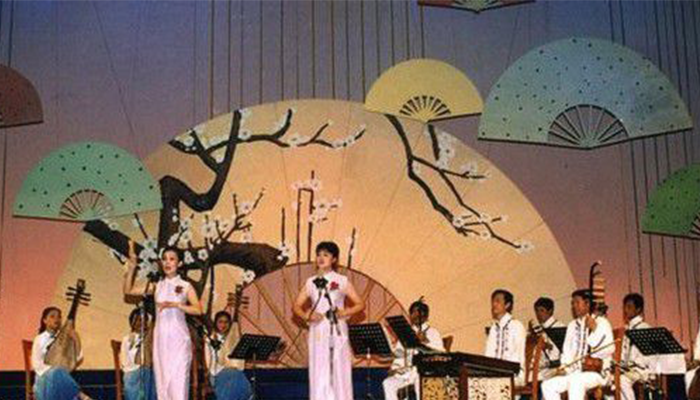
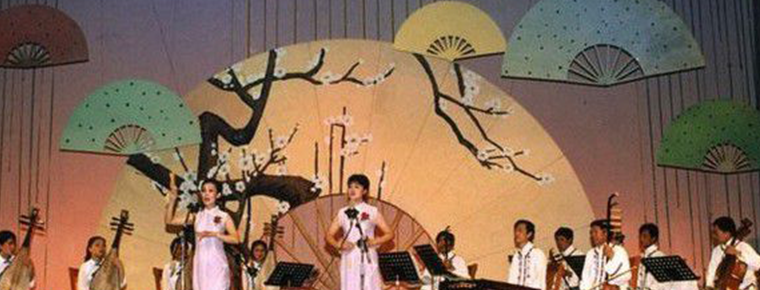
Traveling Books in Ningbo
-
Jiaohe ruins
Jiaohe Old Town is the oldest and most well-preserved native building city in the world. It is also the most complete urban relic preserved in China for more than two thousand years
Views: 150 Time 2018-12-22 -
GongQing Forest Park
Gongqing Forest Park is located in Yangpu District, Shanghai. It is bordered by Huangpu River in the East and Military Road in the west. The total area of the park is 1965 mu, and the open public
Views: 329 Time 2018-12-24 -
jingyuetan national forest park
Jingyuetan, National AAAAA Class Tourist Scenic Spot, National Scenic Spot, National Forest Park, National Civilized Scenic Spot Demonstration Site, National Water Conservancy Scenic Spot, National Na
Views: 134 Time 2018-12-26 -
Danxia Chishui
Danxia National Geopark in Chishui City, Guizhou Province, is located in the southern edge of Sichuan Basin, close to the northern foot of Daloushan Mountain in northern Guizhou Province and the weste
Views: 229 Time 2019-01-05 -
Jinan Paomaling Tourist Area
Shandong Paomaling Scenic Area is located in the southeast of Jinan City, south of the famous mountain in China - Mount Tai, north of the cradle of the Chinese nation
Views: 152 Time 2019-01-21 -
Jiaying Scenic Spot
Jiayingguan, commonly known as the Longwang Temple of the Yellow River, is located in Jiayingguan Township, Wuzhong County, Jiaozuo City, Henan Province, China
Views: 142 Time 2019-01-21 -
Shenyang Science Centrum
Shenyang Science Palace is located in Wulihe Central Business District, Shenyang District, Liaoning Province. It is a large-scale modern popular science education base in Shenyang District. It was bui
Views: 240 Time 2019-02-08 -
Korean Crane Dance
Crane Dance of the Korean Nationality has a long history and is a unique dance performance form of the Korean Nationality in China. It has the national characteristics and the value of artistic resear
Views: 211 Time 2019-04-16 -
Construction Techniques of Wood Construction of Dong Nationality
Dong's wood construction and construction skills, the traditional architectural skills of Sanjiang Dong Autonomous County, Guangxi Zhuang Autonomous Region, one of the national intangible cultural her
Views: 241 Time 2019-04-28 -
Folk Stories in Guangyang Town
"Guangyang Folk Stories" is the general name of folklores and stories widely spread in Guangyang Town. Guangyang folk tales are popular in the local area.
Views: 212 Time 2019-05-01 -
Zhulang Niangmei
Zhulang Niangmei is a work of Dong Opera in Guizhou Province. At the end of the Qing Dynasty, Liang Yaoting and Liang Shaohua, Dong opera masters in Congjiang County, Guizhou Province, adapted Dong dr
Views: 151 Time 2019-08-10 -
Guangan transportation
Located at the junction of Sichuan and Chongqing, Guang'an is an important passage from east Sichuan to Chongqing and southward and eastward. It is also an important node on the national "five vertical and seven horizontal" traffic trunk line
Views: 356 Time 2020-12-19

